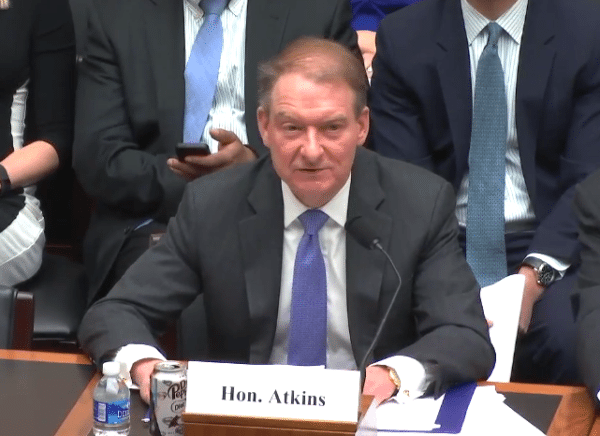
It has been widely reported that Paul Atkins, a former SEC Commissioner and current CEO of Patomak Partners, is the point person in Donald Trump’s transition team for financial regulatory appointments. This is an encouraging sign.
Atkins, a Vanderbilt Law School Grad, was an SEC Commissioner from 2002 to 2008. During his stint at the Commission he gained a reputation for challenging excessive regulations that impede growth and harm consumers. He has become a consistent critic of Dodd-Frank, a bill that many policy makers on both sides of the aisle recognize as problematic and institutionalizing too big to fail. According to WSJ.com;
“At the SEC, Mr. Atkins repeatedly criticized the scope of financial regulation, which he warned often came at the expense of market competition and could lead to unforeseen consequences.”
Atkins is a firm believer in accountability for corporate executives. He would rather punish the individuals that “cooked the books” instead of punishing shareholders who are the people they are supposed to be helping.
This past April (2016), Atkins testified before the House Financial Services Subcommittee on Capital Markets. At this time he shared his philosophy on small business and the JOBS Act – the legislation that legalized investment crowdfunding.
 Atkins stated;
Atkins stated;
“… small businesses are vital to our nation’s economy. Since 2002, small businesses generally have been responsible for almost 50 percent of U.S. private, non-farm GDP.1 In 2012, small businesses with fewer than 20 employees made up almost 90 percent of the 5.73 million employer firms in the U.S.2 Indeed, start-ups and young companies are a primary driver of job creation in the U.S …. What do these numbers really mean? Put simply, if we are serious about spurring strong and lasting economic growth, creating more jobs outside of Washington, D.C., and breaking down our two-tiered economy, we do not need higher taxes or more government spending – instead, the data suggest that we need more entrepreneurs and more small businesses, and we need to continue to create a sensible regulatory environment in which these firms and individuals can succeed.”
For entrepreneurs and small business people, this is exactly the type of understanding and perspective we want to hear.
Atkins was very supportive of the Fix Crowdfunding Act (HR 4855) in its original form.
“While I expect crowdfunding to develop over time into a valuable source of equity capital for America’s small businesses, critics have already pointed to a number of flaws in the SEC’s rules that initially will likely make crowdfunding a less attractive option than Congress intended. By passing H.R. 4855, The Fix Crowdfunding Act, Congress can prevent some of these problems before they negatively impact crowdfunding issuers, crowdfunding platforms, and the ordinary investors seeking to deploy capital to small businesses.”
Atkins pointed to the fact the SEC had the authority to address most of the shortcomings in the JOBS Act instead of waiting for a directive from Congress. He believes the SEC failed to prioritize its activities that could have benefited everyday Americans. He specifically pointed out former SEC Chair Mary Schapiro for falling to political pressure from special interest groups.
 Regarding the emerging Fintech sector, Atkins stated;
Regarding the emerging Fintech sector, Atkins stated;
“As the SEC considers whether and how to regulate fintech, it also should – as my colleague, former SEC Commissioner Dan Gallagher has noted – take a step back and assess the rules governing small business capital formation “on a big picture level.” This effort should include, among other things, a retrospective review of SEC rules to ensure that small companies operate under a regulatory regime that is understandable (without the help of expensive lawyers), up-to-date, and right-sized; improvements to the market structure for publicly-traded small and mid-cap stocks, including measures to enhance market liquidity40 (for example, through the formation of venture exchanges) and eliminate one-size-fits-all disclosure rules and other regulatory requirements that disincentivize companies from going public.”
 The Trump team’s transition website states:
The Trump team’s transition website states:
Financial markets are vital to the American economy. Capital markets bring investors together with creators to fund new ideas and fuel economic growth. Banks and other lenders provide funding to small businesses and mortgage borrowers to help fund the American Dream. Federal policy should focus on free enterprise, while protecting consumers by policing markets for force and fraud. Both Wall Street and Washington should be held accountable.
The current administration was instrumental in pushing through the bi-partisan JOBS Act. This was solid progress but there remains so much more that needs to be done. The fact that Atkins is guiding the new administration on financial regulatory appointments is meaningful as Atkins clearly appreciates the importance of SMEs and emerging Fintech innovation and the nuances of disruption. It is also a sign that Atkins is on the list to be considered for a powerful political appointment to help guide financial sector policy going forward.
Testimony by Paul Atkins delivered to the House Financial Services Committee in April 2016.
[scribd id=330962525 key=key-JhIG1UaimfBjz57ETmOm mode=scroll]

